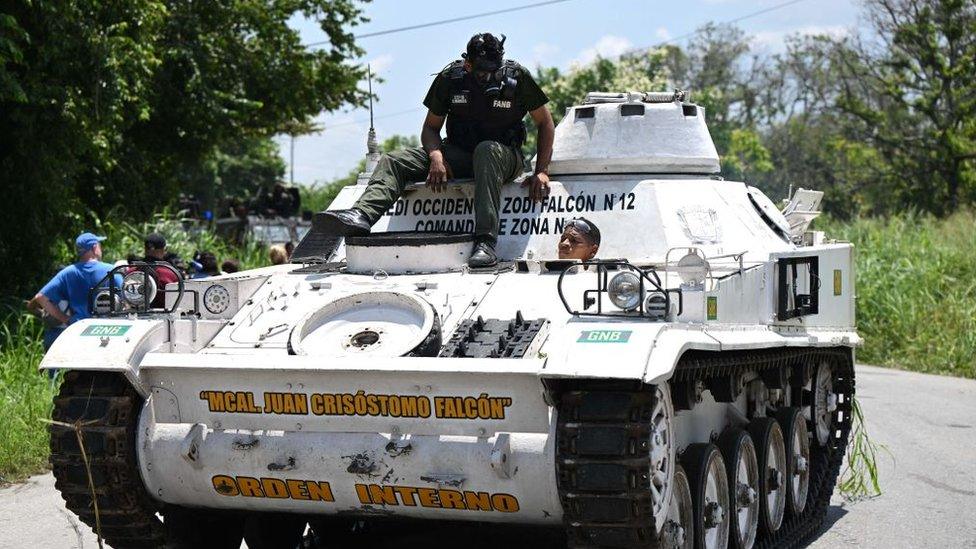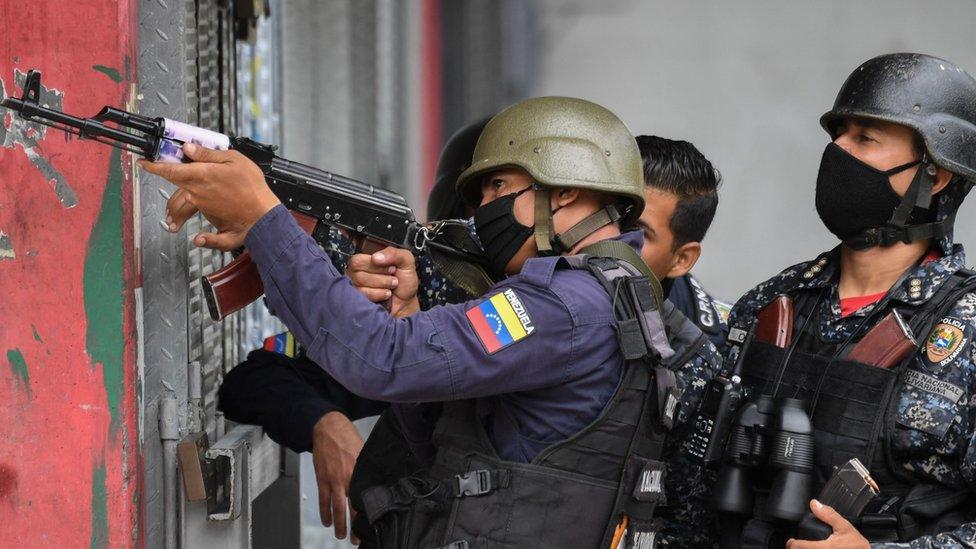Tocorón prison: Venezuela regains control of gang-run jail with pool and zoo
- Published

Armoured vehicles and 11,000 members of the security forces were deployed
Venezuela says it has regained control of a notorious jail, which had been under the control of the powerful Tren de Aragua criminal gang.
Some 11,000 security personnel were deployed to Tocorón prison, which had been run by inmates for years.
Prisoners were able to roam freely inside the penitentiary, which had hotel-like facilities including a pool, nightclub and a mini zoo.
The interior minister said that the jail would be completely cleared.
Tocorón not only held convicted criminals but also some of their partners and relatives, who moved into the penitentiary to be near their loved ones.
One woman, Gladys Hernández, told AFP news agency that she was waiting to hear where they were taking her husband.
"I was living in there, but they kicked us out," she said.
The jail doubled up as the headquarters of the Tren de Aragua, Venezuela's most powerful transnational gang.
From the jail, Tren de Aragua ruled a criminal enterprise spanning several Latin American countries and reaching as far as Chile.
Its members engage in human trafficking, run prostitution rings and extort migrants.
The gang fitted the prison out with all kinds of facilities, such as games rooms and a small zoo complete with flamingos and an ostrich.

Inmates could place bets on horse races, arrange loans at a makeshift bank and dance the night away at a nightclub dubbed "Tokio".
When food and everyday items were hard to come by in Venezuela at the height of the country's economic crisis, one newspaper reported that locals would go to Tocorón to buy the essentials they could not get anywhere else.
AFP journal said that they saw security guards carrying motorcycles, televisions and microwaves from the jail as its inmates were moved.
Ronna Rísquez, author of the book Tren de Aragua: The gang that revolutionised organised crime in Latin America told BBC Mundo's Valentina Oropeza that Tocorón functioned "like a little city".
The author also warned that the clearing of the prison did not automatically constitute the end of the gang.
"Their centre of operations has been closed down, but the leaders of this organisation and its cells abroad can continue functioning," she said.
Officials gave little detail as to how they stormed the prison. The army said that there had been one casualty, a major who had died after hitting his head on the door of an armoured car.
The fact that such a large operation at a jail full of members of Venezuela's most feared criminal gang should have proceeded so peacefully has led to speculation that the authorities may have negotiated with the Tren de Aragua.
In a statement, the government of President Nicolás Maduro congratulated the security forces on "re-establishing order" at the prison and praised them for the "clean and quick actions".
However, a later statement announced that a "second phase" of the operation had been launched, which the government said consisted in "capturing all and every one of the escaped criminals".
Some local media have reported that the leader of the Tren de Aragua gang, Héctor Guerrero Flores, may be among those who absconded, but the government has not named any of the escapees.
Guerrero Flores was serving a 17-year sentence inside the prison for murder and drug trafficking.
However, he was so powerful that he reportedly used to come and go freely from the prison before becoming a full-time inmate, according to Carlos Nieto, a co-ordinator with prison rights group A Window to Freedom.

Sign up for our morning newsletter and get BBC News in your inbox.

- Published5 August 2024

- Published10 July 2021
